On Sept. 15-16, Weill Cornell Medical College and NewYork-Presbyterian Hospital hosted the first World Congress on Interventional Therapies for Type 2 Diabetes, a gathering of nearly 1,000 surgeons, endocrinologists and ethicists from around the world to discuss the efficacy of surgical intervention for the treatment of Type 2 diabetes.
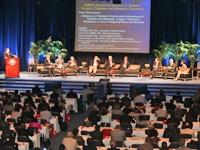
The 1st World Congress on Interventional Therapies for Type 2 Diabetes brought together nearly 1,000 leading health experts.
Held at the Marriott Marquis in Times Square, the Congress was opened by Dr. Antonio M. Gotto Jr., dean of the Medical College, followed by remarks by Dr. Herbert Pardes, president and CEO of NewYork-Presbyterian Hospital, and Dr. Fabrizio Michelassi, chairman of the Department of Surgery at Weill Cornell Medical College and surgeon-in-chief at NewYork-Presbyterian Hospital/Weill Cornell Medical Center.
Also featured at the Congress' opening was Dr. Richard Daines, New York state health commissioner and an alumnus of the Medical College, class of 1978. Dr. Francesco Rubino, associate professor of surgery at Weill Cornell and surgeon-scientist at NewYork-Presbyterian Hospital/Weill Cornell Medical Center, organized and led the Congress.
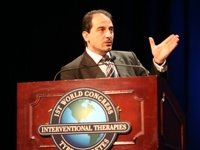
Dr. Francesco Rubino
Diabetes currently affects some 246 million people worldwide — and that figure is expected to grow to 380 million by 2025. "The epidemic growth of Type 2 diabetes has created a race against time to find new approaches to treat and understand the disease," Dr. Rubino told the prestigious audience that came prepared for discussion and debate.
Dr. David Cummings, an endocrinologist at the University of Washington and one of the Congress's 80 faculty speakers, noted "the insights already beginning to be gained by studying surgical interventions may be the most profound since the discovery of insulin."
Adding to the exchange of ideas at the Congress was Dean Gotto, who participated in a panel discussion entitled, "Adequacy of Diabetes Control and Achievement of Diabetic and Metabolic Targets: Resolution, Remission or Cure?"
"Clearly there are benefits to a surgical approach to the treatment of diabetes," Dean Gotto said. "But one of the most important outcomes of this conference will be the continued debate of risk versus benefit to the patient, and determining who makes that decision."
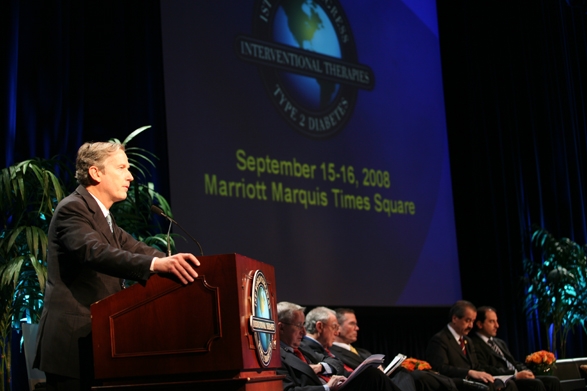
Dr. Fabrizio Michelassi addresses the audience.
The 11 sessions comprising the Congress featured topics such as the outcomes of bariatric surgery for the treatment of Type 2 diabetes, as well as the socio-economic ramifications for the ongoing treatment of this global epidemic.
But as exciting as the new surgical techniques are, Dr. Rubino said, more input from the global diabetes community is vital.
"Diabetes surgery and other novel interventional techniques are not only a promising therapeutic option for selected patients with Type 2 diabetes but also an unprecedented opportunity to shed light on the origin of the disease," he said. "To ensure a timely, scientific and safe development of this emerging discipline it is necessary to balance enthusiasm with caution. This is possible only with the immediate attention and responsible, urgent actions from the global diabetes community."

From left: Dr. Ted Adams (University of Utah School of Medicine); Dr. Bruce Wolfe (Oregon Health & Science University); and Dr. Antonio M. Gotto Jr. (Weill Cornell Medical College).
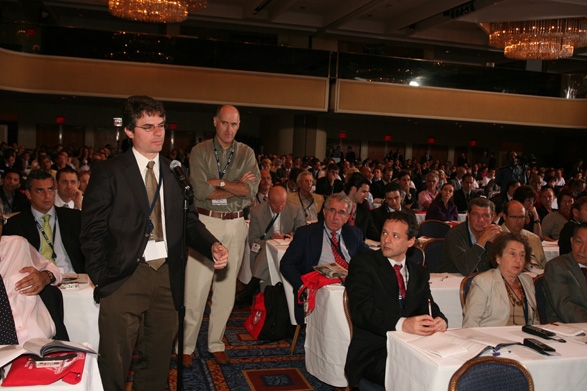
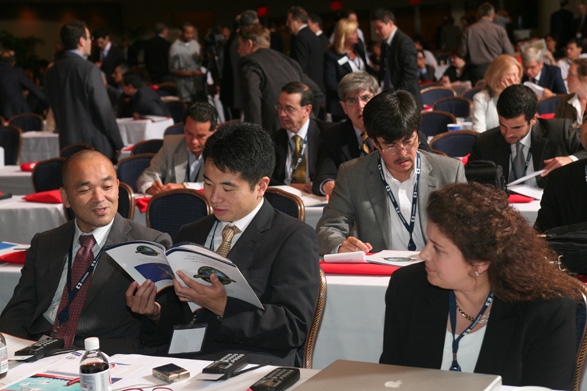
Photography by Richard Lobell.

